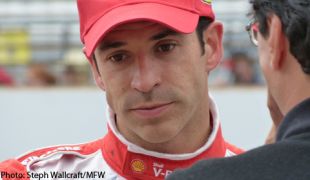IndyCar did the right thing with Castroneves probation and still can’t win
IndyCar, IndyCar commentary — By Steph Wallcraft on April 22, 2014 7:18 pmThis insistence on the instant and constant vilification of every single thing IndyCar does has got to stop.
Helio Castroneves posted a tweet after the Toyota Grand Prix of Long Beach — or a tweet was posted from his account, rather, as he later insisted that his sister was responsible for it — that directly criticized that IndyCar’s officiating: “Indycar officials continuing not punishing some drivers and giving green flag during an accident.” The post was accompanied by a rather creative graphic featuring a large thumbs-down in the middle.
Today, Castroneves was put on probation until June 30th for violating IndyCar’s Social Media Policy.
The responses to this probation that I’ve seen online today have trended heavily along the lines of complaints about drivers not being allowed to have any personality and IndyCar being thick-skinned about the matter.
Yet in many cases it was these exact same people who were listening to Scott Dixon call for race director Beaux Barfield’s ouster after his penalty at Sonoma last year and wondering aloud why Dixon was allowed to be so critical of Series officials without penalty. Other sanctioning bodies would never allow it, naysayers claimed, and IndyCar has no backbone for not standing up for its people.
These days, it seems that IndyCar is damned if they do and damned if they don’t.
Here’s the objective analysis: IndyCar appears to have realized that it could be more strict in applying its own rules about participants slagging Series officials publicly (which isn’t new; see the note below) and is taking more active steps to mitigate such behavior. I’m wading into speculation territory here, but I suspect the only reason Castroneves wasn’t fined in addition to his probation was because he insisted he wasn’t the one who posted the tweet to his account in the first place.
Series participants are told in very clear terms what is considered acceptable and what isn’t, and being openly critical of the actions of IndyCar very clearly isn’t. Does anyone honestly believe any NASCAR driver could have had that tweet posted publicly without being nailed to a cross? Not a chance.
On the other hand, there seems to be less restriction this season on drivers being critical of other drivers. Again, this is speculation, but given the near-180 on inter-driver rivalry this year, especially on TV and on social media, I would wager that it’s likely being encouraged. We could even go so far as to call this the NASCAR model — feel free to be scrappy with each other, but keep it between each other and keep it on the racetrack.
Why use this model? Because from a PR standpoint, it works. Plenty of pundits have been screaming for more conflict to draw attention to the Series, and the apparent policy being applied by IndyCar at the moment puts the conflict in all the right places.
But to criticize IndyCar for taking steps today toward what people have been screaming for all along? It’s nonsense, and it’s a continuation of a long-time trend involving people jumping to any conclusion at all, even a contradictory one, to prove that IndyCar can’t do anything right. A little objectivity would get some people a long way.
—
On the penalty itself, it’s worth noting that while the rule cited in the penalty announcement was Rule 9.3.8, which indicates a Social Media Policy violation, IndyCar’s Social Media Policy (the full text of which is on the next page and is generally very reasonable) doesn’t state itself that disparaging remarks against an official is a direct violation. The apparent nitty-gritty of this penalty is that it actually violates Rule 9.3.7., Personal Criticism of Officials: “If any Member uses improper, profane or disparaging language or gestures and references a specific Official by his/her name or title, such Member may be fined a minimum of $25,000 and/or may be subject to additional penalties based upon the particular circumstances.” The violation just happens to have occurred on social media here, thus invoking the Social Media Policy. No such similarly cut-and-dried rule exists regarding personal criticism of other participants, though that is mentioned in passing in the Social Media Policy.
NEXT PAGE: The full text of IndyCar’s Social Media Policy
Pages: 1 2








